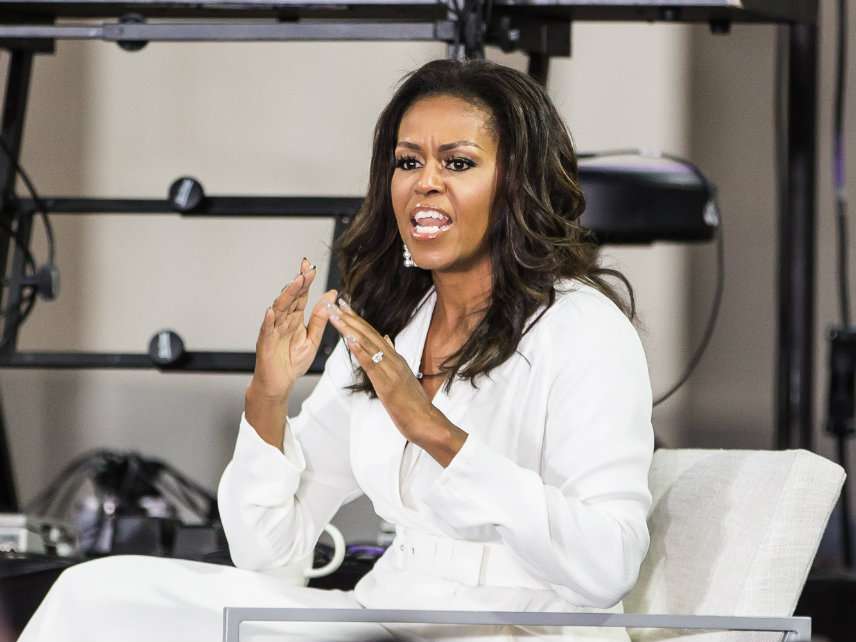Michelle Obama Didn't Want to Nag People About School Lunch
But she sure did anyway!

In her new book, Becoming, former First Lady Michelle Obama indicates that she wasn't trying to force healthy food initiatives down people's throats. But the results of her attempt to get children to eat better tell a different story.
In the months following her move to the White House, Obama tried to "develop the pillars on which our larger effort would be built," she writes. "We'd give parents better information to help them make healthy choices for their families." She adds: "We'd work to create healthier schools. We'd try to improve access to nutritious food. And we'd find more ways for young people to be physically active."
Obama goes on to acknowledge the concern that her efforts might be seen as government overreach. "The West Wing was apparently fretting about my plans, worried I'd come off as a finger-wagging embodiment of the nanny state at a time when controversial bank and car-company bailouts had left Americans extra leery of anything that looked like government intervention," she writes.
But the former first lady claims that wasn't her goal. She writes that she wanted to "make this about more than government." Obama believed a "human appeal" was better than a "regulatory one" in order to convince companies that supply school lunches and produce soft drinks to make changes. It was better to "collaborate," she writes, than to "pick a fight."
Obama was wary of using politics to accomplish her goals. "I wasn't interested in following the tenets of the political world or appearing on Sunday morning news shows," she writes. Still, it seems like it would be impossible for her to carry out all of her plans without politics. It was a memorandum signed in February 2010 by President Barack Obama, after all, that created what she describes as "a first-of-its-kind federal task force on childhood obesity."
Michelle Obama's efforts continued throughout 2010 as she advocated for the passage of the Healthy, Hunger-Free Kids Act, which is most famous for setting nutrition standards for school lunches around the country. Obama notes that while she was "generally happy to stay out of politics and policy making," this was her "big fight—the issue for which I was willing to hurl myself into the ring."
It was a fight she won. Republicans took back control of the House in the 2010 midterms, but President Obama "made the effort a priority in his dealings with lawmakers, knowing that his ability to make sweeping legislative changes was about to diminish," she writes. The president signed the bill into law in December.
The first lady saw this as a big success. Among other things, the bill "added more fresh fruits and vegetables, whole grains, and low-fat dairy to roughly forty-three million meals served daily," Obama writes. "For me, it was a straightforward good thing—a potent, ground-level way to address childhood obesity."
Obama's motives were admirable—healthier children is a worthy goal. The problem is having the federal government tell schools what they can and can't serve to students. As lawyer and food policy expert Baylen Linnekin has explained in Reason, the changes that came about thanks to the Healthy, Hungry-Free Kids Act were not for the better. Not only did food costs go up, but many students decided the quality of the healthier meals was so bad that the food wasn't even worth eating, meaning that lots of food went to waste.
In 2014, Reason's Robby Soave even took note of the sarcastic Twitter label #ThanksMichelleObama, which students used to share pictures of their less-than-appetizing lunches.
Reason's Elizabeth Nolan Brown has noted that school cafeterias should certainly be encouraged to serve healthier food. But as she pointed out, "setting highly specific and ironclad rules for schools across the country crosses the line." The federal government can't possibly know what will work best for each school better than local officials and actual school administrators.
In a 2014 piece for Time magazine, Reason's Nick Gillespie may have put it best: "If we can't trust our schools to figure out how best to fill their students' stomachs, why the hell are we forcing our children to attend such institutions in the first place?"
Michelle Obama seems to have had pure motives when it came to decreasing childhood obesity. Unfortunately, decreasing individual choice wasn't the answer.


Show Comments (47)